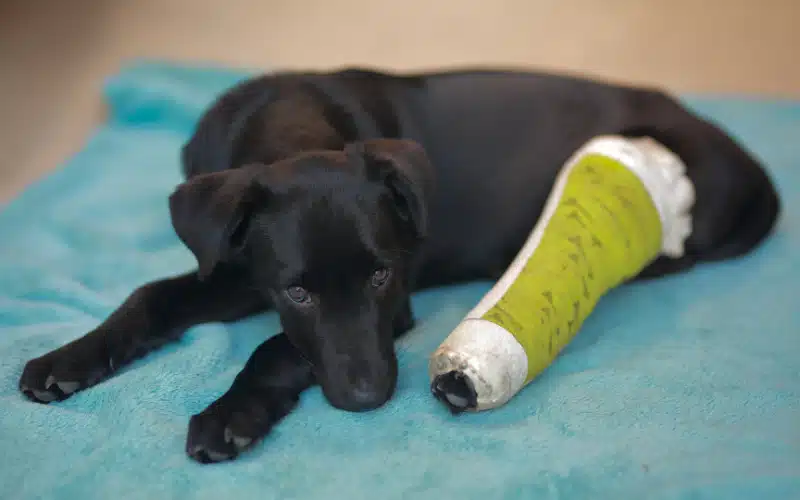
Fractures & Broken Bones: What Pet Parents Need to Know
When your pet experiences an injury, it can be a nerve wracking experience. If they’re limping, yelping, or reluctant to stand, your first thought may be: Is it a sprain? Is it a fracture? And what should I do? Can it wait and see if it gets better on its own?
Keep reading, as we break down the different types of fractures and how they are treated.
Fractures and Broken Bones
Broken bones, also known as fractured bones, come in many different forms. The type of fracture can influence the treatment your pet needs and how quickly they recover. Below are some common types of fractures seen in pets:
Hairline/stress fracture: tiny cracks in the bones that can worsen over time if not treated.
Simple fracture: when the bone breaks, but doesn’t pierce through the skin.
Compound fracture: when the bone breaks through the skin, prompting the need for immediate veterinary care.
Comminuted Fracture: when the bone is shattered into several pieces.
Fractures are often treated by setting the bones so that they can heal, but in some cases, surgical intervention is necessary. It’s important to have your pet seen by a veterinary professional so they can determine the best course of action.The veterinarian will perform a physical exam and likely recommend diagnostic imaging to confirm the presence and severity of the fracture. This will provide the information needed to prescribe the optimal treatment.
When Your Pet’s Fracture Requires Surgery
Orthopedic surgery can be life-saving for dogs with serious orthopedic problems. It can involve repairing or replacing damaged bones, joints, and ligaments. Some common orthopedic surgical procedures for dogs include:
Patella luxation repair: This knee surgery is recommended for dogs that experience recurrent or persistent lameness.
Femoral head resection (FHO): This surgery treats hip disease by relieving pain and restoring mobility.
Tibial tuberosity advancement (TTA): This surgery treats cranial cruciate ligament rupture in the knee joint by cutting and moving the top of the shin bone forward.
TPLO surgery (Tibial Plateau Leveling Osteotomy): This surgery stabilizes the knee joint if the Cranial Cruciate Ligament is ruptured.
Preparing For Surgery
When preparing for your dog’s orthopedic surgery, ask the following questions:
- How long will my pet be hospitalized?
- Will my pet need antibiotics post-surgery?
- How will pain be managed during recovery?
- What restrictions will my dog have following surgery?
- Will my dog need physical therapy?
Signs Your Pet May Be Suffering From a Broken Bone
- A bone that looks out of place
- Abnormal aggression
- Bruising
- Crying, whimpering, or whining
- Immobility
- Limping
- Refusing or reluctant to bear weight
- Swelling
We Can Help Your Pet with Fractures and Perform Orthopedic Surgery When Indicated
Animal Emergency Hospital Volusia and our sister hospital Animal Emergency Hospital DeLand are modern, 24-hour emergency hospitals dedicated to helping pets and their families. Our team of veterinary professionals are ready and available 24/7 to help and that includes performing orthopedic surgery when indicated. If you are worried about your pet, do not hesitate to bring them in. No appointment is necessary, although we always appreciate a call in advance to prepare for your arrival if possible.



